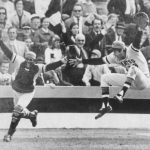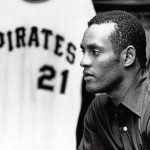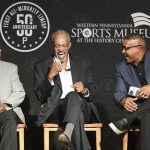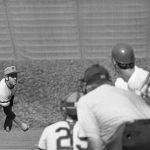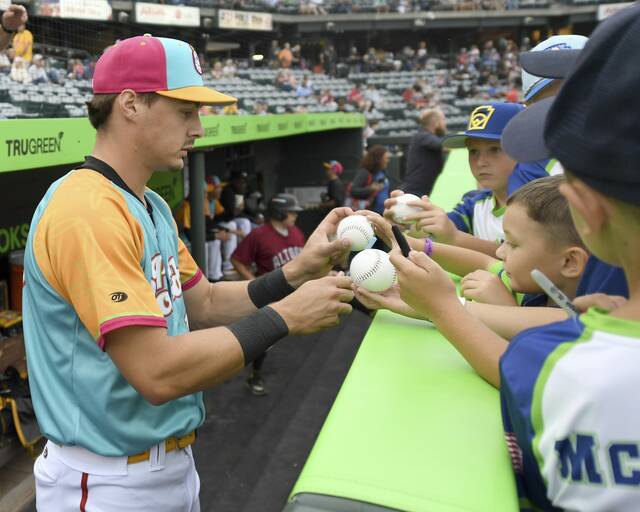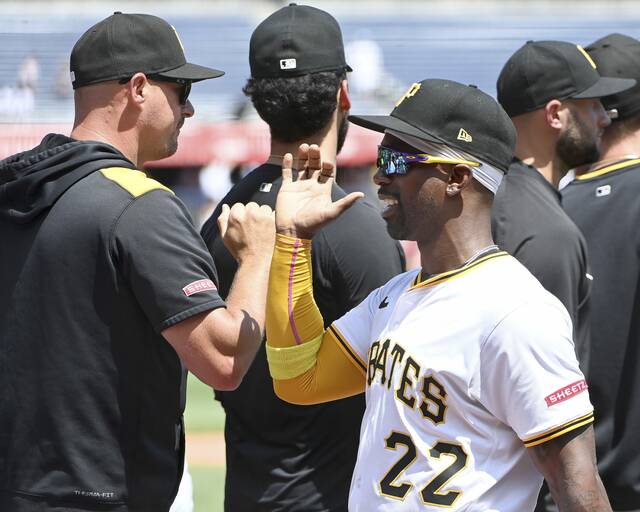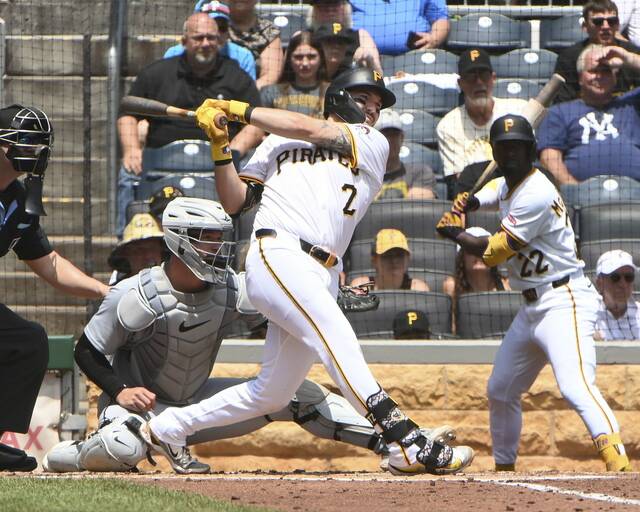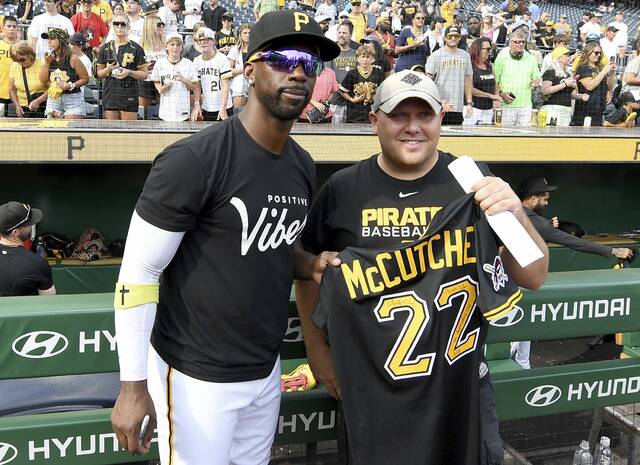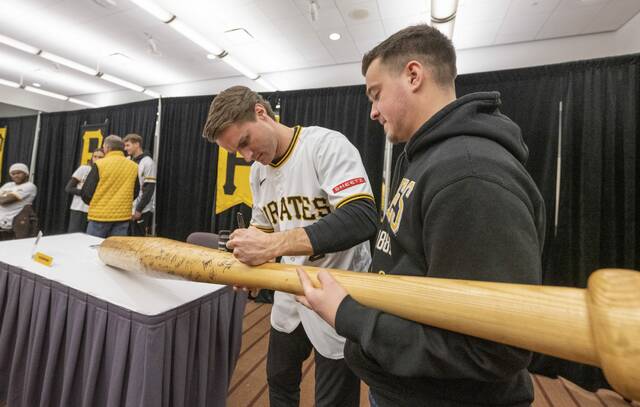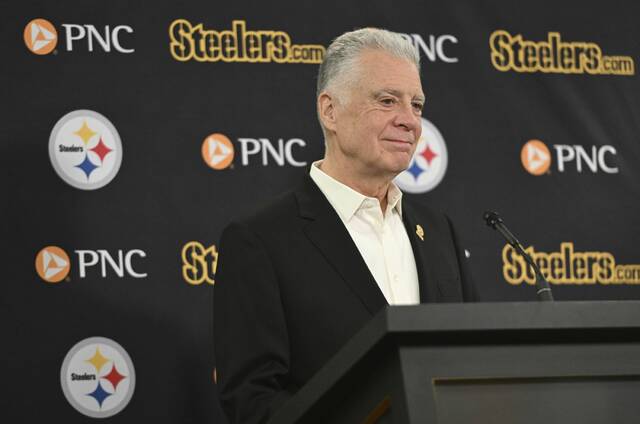Dave Cash remembers the “moment in time” that took his breath away 50 years ago, as though it happened yesterday.
On Sunday, Oct. 17, 1971, the Pittsburgh Pirates were clinging to a 2-1 lead in the bottom of the ninth inning of the seventh game of the World Series at Baltimore’s Memorial Stadium. The defending champion Orioles were trying to mount a rally and had their best hitters coming to the plate.
Big first baseman Boog Powell led off and hit an easy bouncing ball to Cash that took a friendly hop into his mitt. He calmly threw to first baseman Bob Robertson for the first out.
The next batter was power-hitting Frank Robinson, the only player to be named Most Valuable Player of both the National League and the American League. Robinson was having a solid series, hitting .280 with two home runs — one of them a towering shot off Pirates pitcher Steve Blass in the third game at Three Rivers Stadium on a hanging slider.
Cash was horror stricken to see Blass throw a similar pitch to Robinson during his ninth inning at-bat in Game 7.
“When he threw it, I took a deep breath because it just hung there. The thing that really got me is that Blass threw him a slider and it didn’t break. It was a moment in time that stood still,” Cash said. “As a second baseman you’re looking at the (right-handed) hitter and I mean (that pitch) just hung in the middle of the plate and I don’t know how he missed it but Robinson popped it up to the shortstop.
“It was a mile in the air so I know if he had caught it another eighth of an inch lower it would have been out of the ballpark. That’s when I thought we had a chance to win.”
The Pirates have won five World Series in their history — 1909, 1925, 1960, 1971 and 1979 — and they’ve all been close, going the limit of seven games each time.
More often than not, the Pirates have been underdogs going into these Fall Classics and 1971 was no exception. In fact, most pundits basically gave them no chance of winning.
A happy clubhouse in a turbulent year
Though the wild 1960s were over, 1971 was still a turbulent year in America. In April, more than 200,000 people attended an anti-Vietnam War protest march in Washington, D.C. In June, the New York Times began publishing the “Pentagon Papers.” President Richard Nixon was getting ready to run for re-election and Watergate was on the horizon.
Race relations in the United States were tense. A deadly race-related riot took place in Camden, N.J., in August in response to the death of Rafael Rodriguez Gonzales, a Puerto Rican motorist who was beaten and killed by white police officers.
With such turmoil as a backdrop, the clubhouse of the Pittsburgh Pirates, arguably the most racially diverse pro sports roster in America at the time, was an oasis.
“I can’t remember us ever having a fight with a teammate,” Cash said. “It just didn’t happen. We had some arguments and some disagreements if a guy didn’t run out a ball or something like that, but we never came to blows about race relations or things of that nature. We didn’t talk politics in the locker room.”
Robertson described a “joyous” atmosphere in the Pirates clubhouse.
“I think we had the best clubhouse in all of baseball as far as getting along with different players whether they be Black, whether they be Spanish-speaking or whatever,” he said. “That was one complete clubhouse because we got along as a team. We joked around a lot. Maybe Dock (Ellis) would come in and get us all laughing and stuff like that. It was a joyous time; we laughed and played jokes on one another.
“But when we had to go between those white lines, it was competition time.”
While there was friendly competition among the players, such as Robertson and fellow first baseman Al Oliver boasting around the batting cage about how many hits they might get on a given day, there were no petty jealousies on the ’71 Pirates.
“We were a very diversified team that got along extremely well,” Oliver said. “We came together for one common cause, and that was to bring a world championship to Pittsburgh.”
Future Hall of Fame second baseman Bill Mazeroski — who had hit the World Series-winning homer to beat the Yankees in 1960 — had helped set a harmonious tone for the ’71 team by unselfishly tutoring Cash, who was on his way to replacing him in the starting lineup.
“Bill and I became real good friends,” Cash said. ”I was always a shortstop but when I went to the triple-A club (Columbus), they changed me over to a second baseman, and I had no idea what was going on on that side of the diamond. Maz and (manager) Danny Murtaugh (also a former second baseman), brought me to the instructional league and they both were helping me with the pivot in turning the double play, probably the most difficult part of playing second base.
“Maz was the best at it. He stills holds the record for the most double-plays turned in a single season. They were my mentors, both of them. Maz realized he was getting older and the younger bloods were coming.”
That season, Cash would become part of the Pirates’ historic all-minority lineup, a Major League Baseball first on Sept. 1, against the Philadelphia Phillies at Three Rivers Stadium.
Murtaugh said he wasn’t trying to make history that night but, with the Pirates in a pennant race, was simply trying to put the best nine players on the field.
“Murtaugh always knew what he was doing,” said Bill Virdon, the Pirates hitting coach that season. “He was very good at making moves, and his judgement was always outstanding.”
Prolific hitters
The Pirates hitting that season stood out above all of the team’s other qualities. The Bucs batted .274 as a team and led the league with 154 home runs on the way to winning the National League Eastern Division with a 97-65 record.
Bing Crosby, a part-owner of the Pirates at the time, joined play-by-play man Bob Prince on a broadcast that season and was heard to say, “The 1960 (Pirates) team would beat you by a run; these guys will beat you by five runs.”
Third baseman Richie Hebner batted .271 with 17 home runs that year.
“We’d go to a visiting city and people would come out and watch us take batting practice,” he said. “It was very contagious. Everybody hit. It was like you had to hit. If you hit .270, you had a bad year.”
Hebner did not have a bad regular season but the postseason was when he really came through with clutch hits, especially in a best-of-five NL championship series with the Western Division champion San Francisco Giants.
“They beat the hell out of us during the season; they beat us nine out of 12 (games),” Hebner said. “That was a good team with (Willie) Mays, (Willie) McCovey, (Juan) Marichal.”
After the Giants and Pirates split the first two games in San Francisco, the series shifted to Pittsburgh for Game 3. Pirates right-hander Bob Johnson outdueled Marichal, who threw a complete game four-hitter, and Hebner hit a game-winning solo homer in the bottom of the eighth. In Game 4, the Giants took a 5-2 lead but Hebner tied it with a three-run homer off Gaylord Perry. The Pirates never trailed after that and clinched the pennant with a 9-5 victory.
Hebner, 23 at the time, was one of several young players, along with Cash, catcher Manny Sanguillen and outfielder Gene Clines, who made key contributions alongside established stars and future Hall of Famers Mazeroski, Roberto Clemente and Willie Stargell, who led the National League with 48 home runs that season.
“We all came up at the same time and we all learned what it took to win and not be satisfied,” Clines said. “There was an abundance of talent coming through the Pirates system at the same time, and then to be around guys like Stargell and Clemente, it just snowballed.”
Heavy underdogs
In the World Series, the Pirates went up against the Baltimore Orioles, who won 101 games during the regular season and had a starting pitching staff of four 20-game winners — Jim Palmer, Dave McNally, Mike Cuellar and Pat Dobson. The only other Major League team to accomplish that feat was the 1920 Chicago White Sox.
“Those four 20-game winners didn’t bother me one bit. They were in the American League. I was in the National League and I knew they threw more breaking balls in the American League, and I was a good breaking ball hitter,” Robertson said.
Nevertheless, sports writers of the day did not give the Pirates much chance of winning the best-of-seven series. One sarcastically predicted the Orioles “would win in three.”
“But that made it even more rewarding because we were counted out right from the beginning, and we were the only ones that believed in ourselves,” Clines said.
One thing about the Pirates the media underestimated was Pittsburgh’s pitching staff.
“Everybody talked about our hitting, but we had good pitching,” Hebner said. “To win in October you better have good pitching and defense. And that’s what we had.”
Ellis led Pirates pitchers with 19 wins in the regular season and was the starting pitcher for the National League in that year’s All-Star game. Ellis got the start in Game 1 of the World Series but wasn’t sharp and the Orioles beat him 5-3.
The Orioles clobbered Johnson, the Game 2 starter, en route to an 11-3 win.
“After we lost Game 2, we went back in the clubhouse, and Clemente was livid,” Clines said. “Everybody was counting us out and Clemente said, ‘We’re going to go back to Pittsburgh and we’re going to beat their (butts) three games in a row.’”
The comeback
In Game 3, the Pirates pitching staff began to show the toughness that Hebner had bragged about. Steve Blass, a 15-game winner during the regular season but shaky against San Francisco during the playoffs, settled in and pitched a brilliant complete-game three-hitter versus the Orioles.
But the Pirates were only up by one run going to the bottom of the seventh inning. Clemente led off the inning by reaching on an error and Willie Stargell walked to put runners on first and second. Robertson came up and Murtaugh put on the bunt sign. Robertson said he never saw it.
“That was the furthest thing from my mind. We’re down two games. Clemente’s on second and Willie’s on first. I’m not looking down at third base, I can tell you that,” Robertson said. “Why in the world would you have your No. 5 hitter bunt? Who’s playing third base? Brooks Robinson. And with one swing, we could be back into (the series).”
Clemente, realizing Robertson had missed the bunt sign, even tried to call time out but it was too late. Cuellar, the O’s starting pitcher, was already into his windup. Robertson blasted a three-run homer to right-center field for the serendipitous turning point of the World Series. The Pirates went on to win the game 5-1, and Blass said he would pay the fine for Robertson missing the bunt. He was not fined.
The next day, Three Rivers Stadium hosted Game 4, the first night game in World Series history. Lefty starter Luke Walker didn’t make it out of the first inning as the Orioles scored three runs. But rookie Bruce Kison came on in relief and pitched 6 1/3 scoreless innings as the Pirates rallied.
With the score tied 3-3 in the bottom of the seventh, another rookie, catcher Milt May, went in to pinch-hit and looped a single to right-center to score Robertson with the winning run.
“To contribute like that is probably the single-highest moment of my career,” said May at a 50th anniversary reunion last July at PNC Park. “It’s tough to beat that one.”
The Series was tied at two games apiece going into Game 5, and Nellie Briles got the start for the Pirates. Robertson hit a solo homer to dead center off McNally, and Briles pitched a two-hit shutout in a 4-0 victory. The Pirates then led the series 3-2 and would need just one more win in Baltimore to clinch the title.
But the Orioles weren’t going to make it easy. They rallied from a 2-0 deficit to beat the Bucs in the 10th inning of Game 6, 3-2. It was on to what was going to be a tense Game 7.
The Pirates, however, had Blass set to pitch. And they also had Clemente who was in the process of making this World Series his personal showcase. Clemente, by this time baseball’s best right-fielder, had hit safely in every game of the Series, just as he had in 1960, and the best was yet to come. And if the Pirates were nervous, they needed only to look to Murtaugh’s calm demeanor in the dugout which he displayed most of the time.
Orioles manager Earl Weaver, on the other hand, was fiery, argumentative and very much into gamesmanship.
With Blass looking nervous and unsteady early in the game, Weaver came out of the dugout and tried to mess with Blass’ mind. Weaver questioned the umpires about where Blass was standing on the pitching rubber before delivering the ball. He said Blass was in violation of Rule 801, which states the pitcher must throw from the front of the rubber.
“The first inning I’m throwing the ball all over the place,” said Blass in a 2019 interview. “I walk somebody and he came out, and it was so fictitious. It doesn’t matter where you are on the mound as long as some part of your foot is making contact (with the rubber).
“Actually, I got so (ticked) off at him I really forgot how nervous I was. Every time I saw him after the Series, I said ‘Hey, Earl, great to see ya, thanks for helping me settle down.’”
Blass ended up throwing a complete-game four hitter while Clemente’s 12th and last hit of the Series, a booming solo home run to left-center in the top of the fourth inning, gave the Pirates a lead they would not relinquish.
Though the game remained tight throughout, once Blass got by Robinson in the ninth, Merv Rettenmund hit a grounder up the middle that Pirates shortstop Jackie Hernandez fielded flawlessly for the final out.
The Pirates had pulled off the upset against one of the greatest teams in baseball history. Blass allowed a total of seven hits in 18 innings and in any other year would have been named the Most Valuable Player.
Clemente ended up batting .414 for the series with five extra-base hits, including two homers, a triple and two doubles, to go along with his stellar defense. He ended up winning the Most Valuable Player award to become the first Latino to be named World Series MVP.
“Unfortunately, a lot of people in this country didn’t realize how good Clemente was,” Hebner said. “If Clemente played in New York, Chicago or L.A., it would’ve been a different story. Clemente ran everything out. You almost had to play the way he played. If you didn’t, somebody on the team would’ve got on you.”
Clemente died just over a year later in a plane crash on New Year’s Eve, 1972, while attempting to bring relief supplies to earthquake stricken Nicaragua. He was posthumously inducted into the National Baseball Hall of Fame in 1973, becoming the first Latin-American player to be enshrined.
Blass’ career ended in 1974 after he mysteriously lost the ability to control his pitches. But he, along with his teammates, will always have the accomplishment of winning the 1971 World Series to look back on.
“You can look back and say, ‘Damn, we were so lucky to be part of that group.’”









